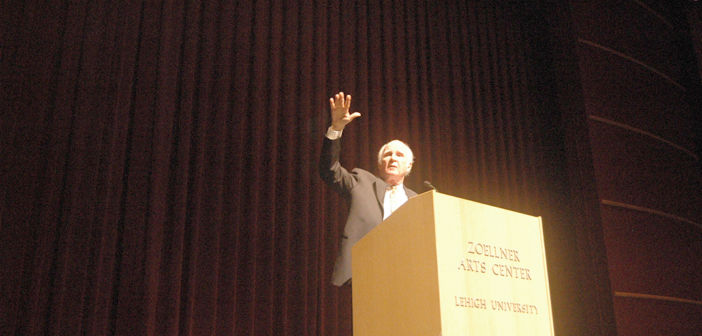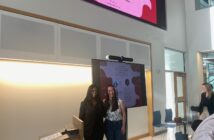Voter registration closed in Pennsylvania Oct. 11. Although U.S. citizens ages 18 to 35 comprise 31 percent of the overall electorate, a small fraction of those in this age group are expected to vote in this election, according to a study conducted by the Pew Research Center.
Award-winning author and activist Taylor Branch gave a talk titled, “Voting Rights: A Civil Rights Challenge Yesterday and Today,” in Zoellner Arts Center on Sept. 20.
Most famous for his civil rights era trilogy “America in the King Years,” Branch focused his talk on institutionalized racism, as well as the limitations minorities face when voting. He stressed the importance of the right to vote, especially because he believes this is one of the most important elections in the past few decades.
“We live in a time where our national political discourse has reverted back to high school, at best,” Branch said.
He said the American population — specifically younger, cynical voters — takes the right to vote for granted.
“Most people laugh that you can run a government on votes rather than armies,” Branch said.
Branch said though we are living in a post-civil rights era, the state of our country continues to require major improvement for its minority communities. Noticing an abundance of violent imagery flooding the media in recent years, Branch took the time to emphasize the belief that voting is “a piece of non-violence.”
Saladin Ambar, an associate professor and the chair of the political science department, said the right to vote must be looked at with more significance.
“Voter rights are in jeopardy, not to the degree that they were in the 1960s, but certainly there have been attempts to push back the gains from the Voting Rights Act,” Ambar said. “They’re very much up for grabs in certain jurisdictions, in some states.”
According to the United States Census Bureau, the age group with the lowest voter turnout rate remains the 18- to 24-year-old group. About 38 percent of individuals in the age group arrived at the polls for the 2012 presidential election.
Branch said it is hard to convince younger generations that votes matter, and the fight does not end when their favorite candidate is eliminated from the race.
Lloyd Steffen, a co-chair of the MLK Celebrations Committee, was responsible for bringing Branch to Lehigh and is passionate about Lehigh students exercising their rights to vote.
“Students are citizens and need to participate in the national life of the community,” Steffen said. “Lehigh students should take their citizen duties very seriously and get out and vote.”
Branch said this generation lacks gumption. In the civil rights era, young people were the actors themselves. They held debates and did not stop until changes were made. He said he doesn’t see that kind of fire anymore and contemporary movements need these kinds of values.
Victor Contreras, ’20, said the election is a matter of which candidate is more ridiculous than the other. He said it is crucial for citizens to exercise their right to vote, especially in this election.
Christine Bratu, a visiting scholar from Germany, attended the talk because she also feels voting rights are important.
“Everybody should have the same chance, but I’m not quite sure we’re there yet,” Bratu said. “The most striking difference in this election is how combative it is and how much nonsense is masqueraded as politics.”
Bratu attended the talk because she thought its core focus would be modern day voting practices. She said Branch focused on civil rights.
“The core idea of democracy is: one person, one vote,” Bratu said. “You should realize that it is important to exercise this right, because otherwise you’re screwing the system. Then it’s not democracy anymore.”






Comment policy
Comments posted to The Brown and White website are reviewed by a moderator before being approved. Incendiary speech or harassing language, including comments targeted at individuals, may be deemed unacceptable and not published. Spam and other soliciting will also be declined.
The Brown and White also reserves the right to not publish entirely anonymous comments.